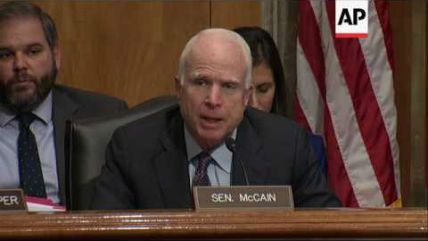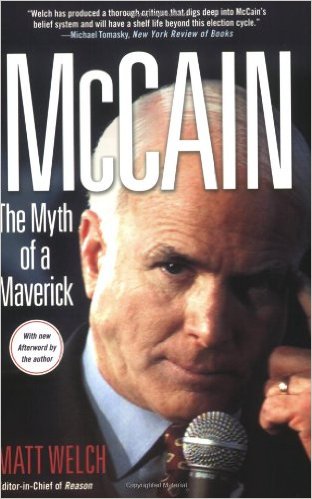John McCain Approves of All Trump Nominees Except the Fiscally Conservative Budget Director Who Dares Question Military Spending
The media's favorite maverick makes his priorities clear: America must stay militarily extended, forever


Get you a man/woman who looks at you the way the political press looks at Sen. John McCain (R-Ariz.) when he's being a "maverick"—i.e., opposing Republican politicians and policies most political journalists dislike. "John McCain has emerged as a leading Republican dissenter," gushed a Boston Globe headline. "The maverick is back," declared the Washington Times. (In fact, the Maverick, not unlike Freddy Krueger, can never ever ever ever ever really go away.)
To be sure, there are obvious hooks to this latest exhumation—McCain's warning-shot about Trump-administration "dysfunction," his opposition to the travel-ban executive order, anxiety about trade wars, one-man repair work on U.S.-Australian relations, criticism of Yemen operations, line-holding on torture, and so on. But where the rubber meets the road in McCain's own Senate votes—on Trump's picks for the Cabinet and other confirmation-requiring positions—the senior Arizona senator has lined up 100 percent of the time with the man who (inaccurately) mocked his prisoner-of-war heroism. From Rex Tillerson to Jeff Sessions, Mike Pompeo to Steven Mnuchin, every controversial and non-controversial nominee alike put forward by a president who clearly disdains and shares few values with McCain has nonetheless received the Maverick's explicit on-the-record blessing.
Until now.
Yesterday, McCain reconfirmed to reporters that he's "leaning against" Rep. Mick Mulvaney (R-South Carolina) to lead the Office of Management and Budget. Why would a Republican senator oppose a House Freedom Caucus co-founder known for his fiscal hawkishness, opposition to crony capitalism, and distaste for mercantilism? Because Mulvaney dares question the missions of and expenditures on the U.S. military:
"He's anti-defense," McCain, chairman of the Senate Armed Services Committee, said.
As a member of the House, Mulvaney regularly opposed funding bills that boosted military spending beyond levels mandated by sequestration, or set cuts.
"He voted to remove all of our troops from Afghanistan," McCain said. "That's just bizarre."
What's even more bizarre than voting to remove U.S. troops from Afghanistan is voting constantly to keep them there, while concurrently agitating for ever-more activity abroad by an over-stretched military. Twice as many American soldiers died in Afghanistan during the Obama administration than during its predecessor, and for what, precisely?
McCain's dickish "anti-defense" demagoguery is no surprise here given his rude treatment of Mulvaney at last month's confirmation hearings, during which he slammed the congressman as "an impediment" to military readiness:
Mulvaney said the government's No. 1 priority was defending the nation. "That's nice to hear that you feel they're important because you've spent your entire congressional career pitting the debt against our military and each time, at least for you, our military was less important," McCain responded. […]
"I am deeply concerned about your lack of support for our military, about your continued votes for withdrawals from Europe when we see a world on fire," McCain said. […]
"Don't know you where 9/11 came from?"
McCain's hawkish belligerence is a reminder of the deep fractures that lie just under the surface of the Trump-wary portion of the GOP. On one side, quite clearly, you have the libertarian-leaners. On the other you have the historically anti-libertarian interventionists. It's a weird time when the Twitter feeds of Bill Kristol and Rep. Justin Amash (R-Mich.) overlap in critique and tone, but here we are.
As Nick Gillespie pointed out this morning, President Trump's bull-in-china-shop act at least has the side benefit of exposing some of D.C.'s pre-existing pathologies and power structures. Mindless, chest-thumping hawkishness continues to matter more to an entire swath of the Beltway than subsidiary issues like corruption and retrograde criminal-justice policies.
